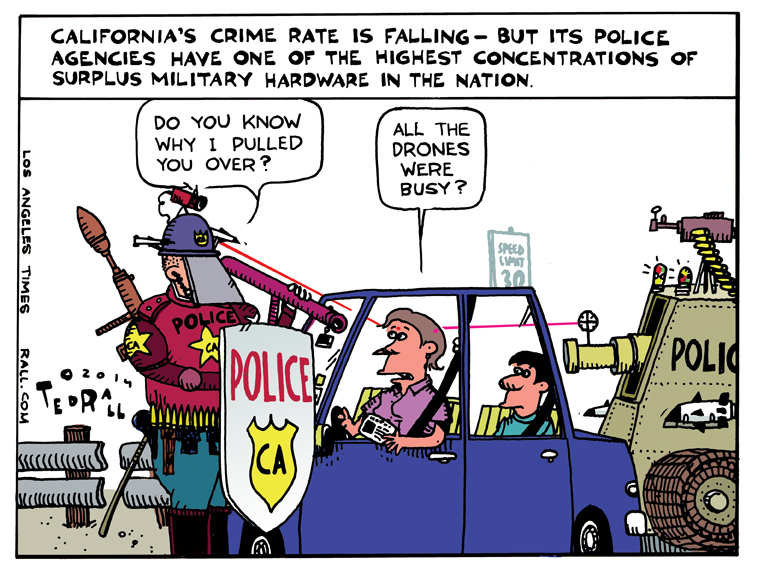Crime is falling in California. Yet the state’s police agencies have one of the highest concentrations of surplus military hardware in the United States. People started paying more attention to a post-9/11 Defense Department program to transfer military gear used against Afghanistan and Iraq to civilian police departments here in the United States in the wake of racially charged clashes between demonstrators and heavily armed police in Ferguson, Missouri.
California law enforcement agencies began seriously taking an interest in military style hardware after a February 1997 shootout between bank robbers and overwhelmed cops in North Hollywood. In most places at most times, however, police rarely confront criminals with that much high-powered weaponry. That’s why California Police Chiefs Association president Christopher Boyd’s claim that “all of this equipment is needed…Most police departments cannot afford to buy them” seems a bit, well, over the top.
When you have to go back nearly two decades in order to justify the need, it looks more like a reaction to a quantum singularity than a genuine necessity – and given what happened in Ferguson, there is a real concern that police militarization widens the chasm of trust between law enforcement and the communities they are supposed to serve.
You can’t blame police for wanting the most powerful weapons and the strongest defensive capabilities in order to protect officers. But policing is at least as much about politics as it is about protection. Not politics as in Democrat or Republican, but the politics of a tense relationship between free citizens, most of whom are law-abiding and pay the salaries of the cops, and municipal employees who were supposed to be more concerned about protecting the public than themselves.
After Ferguson, many of my white friends defended the police’s use of military style hardware as just good sense given the dangers of the streets in that St. Louis suburb. Then I would ask them: if you trust the police, if you’re not afraid of them, if you feel that the ultimate defense is not having done anything wrong, then how you feel when you see the flashing lights in your rearview mirror? Happy? Completely unafraid? None could honestly answer yes.
It seems counterintuitive, but this is one of those cases in which civilian oversight necessitates protecting the police from themselves by prohibiting them from protecting themselves too much.
For today’s cartoon, I push the “what if this trend continues?” envelope – but really, truly, I don’t think that we are really all that far from the dystopian nightmares portrayed by countless science-fiction novels and films. I’m 51 years old. If you’d told me, when I was 21, that the United States would become a country whose government and law enforcement officials were terrified of their own citizens, that they would treat us like surly victims of a foreign occupation army, I would have rolled my eyes. I was a cynical punk rocker back then, but things have gotten worse than I ever imagined.


7 Comments.
During the cold war, you used to see lots of pictures of grim faced Soviet cops standing on street corners brandishing Kalashnikovs. Isn’t that terrible? Aren’t you glad you don’t live in the USSR?
Another reason I live in Mexico. I’m safer here, even though the cartels are running things. 🙁
I lived in Mexico in the 80s. I was a child, so I don’t remember if the uniformed guys with big guns were some kind of riot police or regular military, but there were lots of them. Maybe it’s just that I remember election year most. Ahhh. Does PRI still hand out sandwiches on Election Day?
I miss Mexico.
A fav writer once said something to the effect of the following:
you can judge the level of civilization of a place judging by the numbers of uniformed men holding guns you see in daily life.
@ olegna78 –
As a foreigner (expat) I am forbidden from involving myself in politics, so I can’t answer your question about the sandwiches.
But the guys in black uniforms who carry the M-16’s (or AR-14’s) are police; if they wear fatigues (or camo) they are military. And there is no “posse comitatus act” in Mexico.
I absolutely LOVE the two laser tracks going to the woman’s head. If there’s anything that perfectly sums up the idiocy of the overreaction of police forces in the U.S., it is that image: A woman in a car with a child, OF COURSE you need snipers.
Here in New York, the cops put up checkpoints in the subway to randomly search bags. They don’t do this at ALL entry points to the station. Nor do they do this at ALL subway stations. I think that the terrorists are being delayed mainly because they keep looking and saying, “Oh, no. It can’t be THIS easy. There’s gotta be a trick in this somewhere.” Meanwhile, Grandma in a wheelchair is being cavity searched by people who couldn’t even graduate from an American high school.
Oh, c’mon Alex – you’re just pulling our collective leg. Of course cops don’t set up random searches. That would be illegal. Nor can they target only specific stations – that’s “selective enforcement” which is likewise illegal.
:: sigh:: they can get away with it on planes because of a little something called “implied consent” – nobody’s forcing you to get on the plane, you could just as easily drive.
But in NYC, the subway is many people’s only realistic choice for transportation. You could be a good citizen and ask them to stop … be sure to notify your next of kin first.
CrazyH,
I tried driving to Hawaii. That’s the last time I ask George W. Bush for directions …